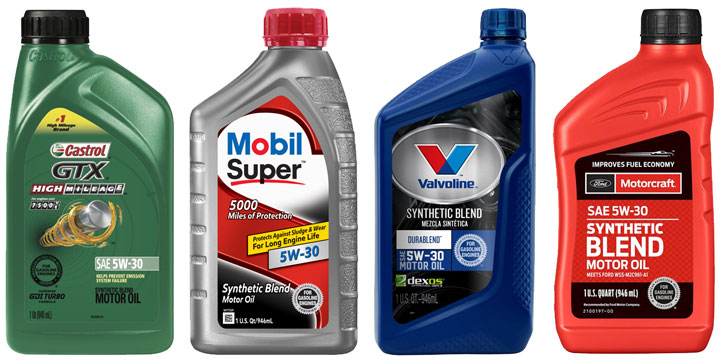Synthetic oil offers better engine protection and performance than conventional oil due to its advanced formula. While conventional oil is cheaper, it requires more frequent changes and may not offer the same level of engine protection.
When choosing between synthetic and conventional oil, it’s essential to consider factors such as your vehicle’s age, driving conditions, and maintenance schedule. Understanding the differences between these two types of oil can help you make an informed decision that will benefit your engine in the long run.
Let’s explore the key distinctions between synthetic and conventional oil to help you determine which option is best suited for your vehicle’s needs.

Credit: www.expresswaytoyota.com
Introduction To Synthetic And Conventional Oil
When it comes to changing the oil in your car, you are presented with two main options – synthetic or conventional oil. Both have their benefits and drawbacks, and it can be hard to determine which one is the right choice for your vehicle. In this post, we will take a closer look at synthetic and conventional oil, starting with an introduction to the two types of oil.
What Makes Them Different
The main difference between synthetic and conventional oil is the process by which they are made. Conventional oil is derived from crude oil and undergoes a refining process to remove impurities. Synthetic oil, on the other hand, is chemically engineered to have a more uniform molecular structure, resulting in a more stable and consistent product.
Another difference between the two types of oil is their performance. Synthetic oil is known for its superior performance in extreme temperatures, providing better protection for your engine during cold starts and high heat conditions. Conventional oil, while still effective, may not perform as well in these extreme conditions.
The Evolution Of Motor Oils
The evolution of motor oils has led to the development of synthetic oil. In the past, conventional oil was the only option available for car owners. However, as engines became more advanced and required better protection, synthetic oil was developed to meet these needs. Today, synthetic oil is widely available and is the recommended oil for many newer vehicles.
It is important to note that while synthetic oil may be the better choice for some vehicles, it is not always necessary. It is always best to consult your owner’s manual or a trusted mechanic to determine which type of oil is best for your vehicle.
Choosing between synthetic and conventional oil can be a difficult decision. Both have their benefits and drawbacks, and the decision ultimately comes down to your individual needs and preferences. Hopefully, this post has given you a better understanding of the differences between the two types of oil and will help you make an informed decision when it comes time to change your oil.

Credit: www.delmotors.com
Breaking Down Synthetic Oil
Synthetic oil is a popular choice for modern car owners due to its superior performance and protection. Breaking down synthetic oil, it’s essential to understand the manufacturing process, key benefits, and drawbacks.
Manufacturing Process
Synthetic oil is crafted in a lab using chemically modified petroleum components, resulting in a more uniform molecular structure. This meticulous process ensures optimal purity and performance, making it an ideal lubricant for today’s high-tech engines.
Key Benefits And Drawbacks
The benefits of synthetic oil include improved viscosity at extreme temperatures, reduced engine wear, and enhanced fuel efficiency. However, it tends to be pricier than conventional oil and may not be necessary for older vehicles with low mileage.
Exploring Conventional Oil
How It’s Made
Conventional oil is derived from crude oil through a process of drilling, extraction, and refining. The crude oil is first located through geological surveys and then extracted using drilling rigs. Once extracted, it is transported to a refinery where it undergoes a series of processes such as distillation, cracking, and treatment to produce the final product, which is the conventional motor oil used in vehicles.
Advantages And Limitations
Conventional oil offers effective lubrication and is compatible with older vehicle engines. However, it has limitations in terms of performance in extreme conditions and requires more frequent changes compared to synthetic oil. Additionally, conventional oil may contain impurities and has a higher environmental impact due to the drilling and refining processes involved.
Performance Comparison
Synthetic oil offers superior performance over conventional oil, with better protection and longer engine life. The advanced formula of synthetic oil ensures smoother operation and improved fuel efficiency compared to conventional oil. Make the switch for enhanced engine performance and longevity.
Engine Protection
When it comes to engine protection, both synthetic and conventional oils play a crucial role. However, synthetic oil has an edge over conventional oil in terms of its superior protective properties. Synthetic oil is engineered to provide maximum lubrication and minimize friction, which ultimately leads to reduced wear and tear on engine components. Its advanced formula also helps to prevent the formation of harmful deposits and sludge, ensuring a cleaner and healthier engine.
Fuel Efficiency
Fuel efficiency is a key consideration for every vehicle owner. Synthetic oil offers better fuel efficiency compared to conventional oil due to its superior lubricating properties. The reduced friction provided by synthetic oil allows the engine to run more smoothly, resulting in improved fuel economy. Additionally, synthetic oil is designed to withstand higher temperatures, which means less energy is wasted on overcoming friction, leading to better overall fuel efficiency.
Environmental Impact
When it comes to choosing between synthetic and conventional oil, considering the environmental impact is crucial. The type of oil used in your vehicle can have a significant effect on the environment, including factors such as biodegradability and emissions.
Biodegradability
Synthetic oil is known for its superior biodegradability compared to conventional oil. It is designed to break down more readily in the environment, reducing the risk of pollution in case of a spill or leakage. This is because synthetic oil is engineered using carefully selected base oils and additives that enhance its biodegradability. On the other hand, conventional oil contains more impurities and additives that hinder its natural degradation process.
Emissions
When it comes to emissions, synthetic oil has the advantage over conventional oil. Synthetic oil is formulated to have a lower volatility, meaning it evaporates less at high temperatures. As a result, it produces fewer harmful emissions, such as volatile organic compounds (VOCs) and greenhouse gases. Conventional oil, on the other hand, tends to have higher levels of these emissions due to its composition and lower resistance to high temperatures.
Moreover, synthetic oil also helps to reduce the formation of sludge and deposits in the engine, which can further contribute to lower emissions. By keeping the engine cleaner and more efficient, synthetic oil plays a role in reducing the overall environmental impact of your vehicle.
In conclusion, when considering the environmental impact of using synthetic versus conventional oil, it becomes clear that synthetic oil offers several advantages. Its superior biodegradability and lower emissions make it a more environmentally friendly choice for your vehicle.
Cost Analysis
When it comes to choosing between synthetic and conventional oil, one of the most important factors to consider is the cost analysis. Understanding the initial outlay and long-term savings associated with each type of oil can help you make an informed decision for your vehicle’s maintenance needs.
Initial Outlay
The initial cost of synthetic oil is higher than that of conventional oil. However, this higher upfront investment can lead to potential long-term savings due to the superior performance and longevity of synthetic oil.
Long-term Savings
Synthetic oil offers greater long-term savings due to its extended drain intervals and enhanced engine protection. While conventional oil may have a lower initial cost, the more frequent need for oil changes and potential engine wear can result in higher long-term expenses.
Real-world Applications
Synthetic and conventional oils have various real-world applications in different industries, including automotive, industrial, and aviation settings.
Automotive Use
In the automotive sector, synthetic oils offer superior performance and protection for engines, especially in extreme conditions.
Industrial And Aviation Settings
Synthetic oils are widely used in industrial machinery and aviation applications due to their ability to withstand high temperatures and provide long-lasting lubrication.

Credit: blog.amsoil.com
Making The Right Choice
Choosing between synthetic and conventional oil is crucial for your vehicle’s performance. Synthetic oil offers better protection and longevity compared to conventional oil. Make the right choice to ensure your engine runs smoothly and efficiently.
Vehicle Requirements
Different vehicles have different needs for oil, so it’s vital to consider manufacturer recommendations. Synthetic oil may be preferred for high-performance or newer models requiring enhanced protection. Conventional oil can suffice for older vehicles or those with less demanding specifications.
Personal Preferences And Environmental Considerations
Personal preferences play a role in choosing between synthetic and conventional oil. Synthetic oil offers longer-lasting performance but comes at a higher cost. Conventional oil may be more budget-friendly but requires frequent changes. Environmental impact is another factor, as synthetic oil is generally more eco-friendly due to its cleaner production process.
Frequently Asked Questions
What Is The Difference Between Synthetic And Conventional Oil?
Synthetic oil is man-made, while conventional oil is derived from crude oil. Synthetic oil lasts longer and performs better than conventional oil.
Which Type Of Oil Is Better For My Car?
It depends on your car’s make and model, as well as your driving habits. Synthetic oil is generally better for newer or high-performance cars.
Does Synthetic Oil Really Improve Engine Performance?
Yes, synthetic oil can improve engine performance by reducing friction and wear, as well as providing better protection in extreme temperatures.
Is Synthetic Oil More Expensive Than Conventional Oil?
Yes, synthetic oil is typically more expensive than conventional oil, but it can save you money in the long run by requiring fewer oil changes and improving fuel efficiency.
Can I Switch From Conventional To Synthetic Oil?
Yes, you can switch from conventional to synthetic oil. However, it’s important to follow the manufacturer’s recommendations and use the correct viscosity.
How Often Should I Change Synthetic Oil?
It depends on your car’s make and model, as well as your driving habits. Generally, synthetic oil can last longer than conventional oil, but it’s still important to follow the manufacturer’s recommendations.
Is Synthetic Oil Better For The Environment?
Synthetic oil is not necessarily better for the environment, as it is still derived from non-renewable resources. However, it can help reduce oil consumption by requiring fewer oil changes.
Can I Mix Synthetic And Conventional Oil?
It’s not recommended to mix synthetic and conventional oil, as it can reduce the performance benefits of synthetic oil. It’s best to stick to one type of oil.
Conclusion
To summarize, choosing between synthetic and conventional oil depends on various factors such as the vehicle’s age, driving conditions, and budget. Synthetic oil offers better performance and protection, especially in extreme temperatures, while conventional oil is more affordable. It’s important to consider the manufacturer’s recommendations and consult with a professional to make an informed decision.
Ultimately, the choice boils down to personal preference and priorities. Keep your engine running smoothly by selecting the oil that suits your needs best.


